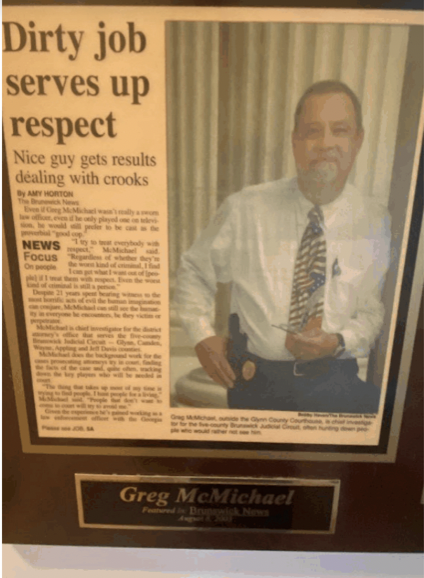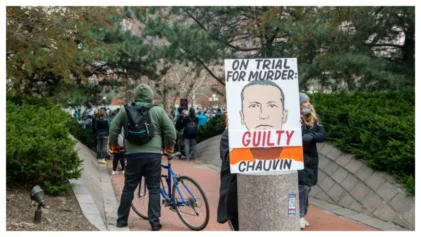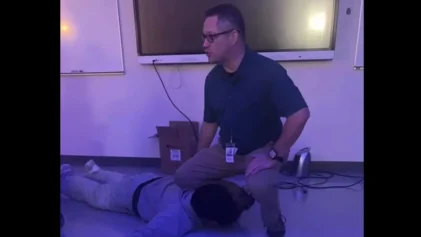An federal judge has denied a request from the white men who chased an unarmed Black man with guns in a Georgia neighborhood, a slaying that amplified the existence of modern-day racial violence in America, to overturn their federal hate crime convictions.
Gregory McMichael and his son Travis McMichael followed Ahmaud Arbery in their pickup trucks in Satilla Shores neighborhood near Waycross in February after suspecting him of burglarizing a house under construction. Travis McMichael shot the 25-year-old man three times and his father, who helped corner Arbery, recruited help from his former boss, a local district attorney, in an attempt to evade prosecution.
The father-and-son duo argued there wasn’t evidence that the crime was racially motivated and that the street where Arbery was killed isn’t public, which is required to prove they violated the man’s rights. U.S. District Judge Lisa G. Wood dismissed the arguments on Thursday.
“The McMichaels argue that there is insufficient evidence to support any of their convictions. They are wrong,” Wood wrote in the 27-page report Thursday. “Most of the their arguments either misconstrue the relevant statutory provisions or fail to properly apply the Rule 29 standard to the evidence. Thus, the McMichaels are not entitled to judgments of acquittal.”

The McMichaels and a third man, William “Roddie” Bryan, who recorded the killing, were sentenced to life in prison without parole on state murder charges. In February, a federal jury found the vigilante crew guilty of hate crime charges and attempting to kidnap Arbery as he jogged down the street. They are expected to be sentenced on Aug. 8.
The elder McMichael argued that unlike his co-defendants who used the racial epithets, he was motivated by race. Most of the evidence of his racism came from his and Bryan, his defense attorneys argued. However, the judge said Gregory McMichael posted memes comparing Black people to white Irish people, made “disparaging and racist remarks” about a Black tenant and vilified a civil rights activist.
The McMichaels also argued that the kidnapping charges should be dropped because there is no evidence that they detained Arbery for “ransom or reward,” but Wood said that the men pursued the Black man to support their “vigilante urges” for which prosecutors presented Facebook posts about their discussion recent thefts at the vacant house.
Wood must also consider Gregory McMichael’s request for leniency in his sentencing. He was found guilty of using, carrying and brandishing a .357 Magnum revolver too. In his memo filed Monday, his attorney, Attilio J. Balbo, asked the judge to give McMichael 20 years in prison instead of the recommended life sentence and to let him serve his time in a federal facility.
Balbo said the judge should consider Gregory McMichael’s safety in prison, his past efforts to save Black people, his military and law enforcement career and the 65-year-old man’s health.
“Clearly the offenses to which Greg McMichael has been found guilty warrant a substantial period of incarceration; that is not being contested in this Memorandum,” Balbo wrote. “To ensure the physical safety of Greg McMichael, however, he should not be sent to a state prison system whose very operation may enable inmates to engage in dangerous and even deadly activity.”
During McMichael’s time in the U.S. Navy, Balbo said Gregory McMichael saved a Black shipmate from drowning. His wife, Leigh McMichael, pushed back on allegations that her husband is racist, recalling when he protected a Black man who drove a lawn mower 10 miles on a highway to find food at 3 a.m. Gregory McMichael worked in law enforcement for over 30 years and received accolades for his humanity, Balbo wrote.
“Greg’s partner, at that time, relayed to me recently that instead of giving the guy a hard time, Greg chose to follow the guy back up [Highway] 341 to make sure he arrived home safely,” Leigh McMichael said in her letter, asking Wood to “have Mercy on Greg.”

Still, during the trial, federal prosecutors mentioned that Gregory McMichael went into a “long, angry rant” after a conversation about the death of civil rights activist Julian Bond.
“I wish that guy had been put in the ground years ago,” he was quoted saying. “All those Blacks are nothing but trouble. I wish they would all die.”
Balbo said the elder McMichael is also “the quintessential family man” and included smiling family photos in the court documents. He added that the older man has dealt with a string of “medical ailments,” including suffering a stroke and battling depression and anxiety. Travis McMichael testified in the state trial that his father suffered heart attacks and had hip surgery.
“Any discussion of Greg McMichael as a person cannot be completed without addressing the seriousness and history of his medical ailments. He suffered a stroke approximately six years ago, which led to the implanting of a monitor on his heart to catalog fibrillation,” Balbo wrote. “Prior to being incarcerated in 2020, Greg McMichael used a small device the size of a phone to receive data from this monitor. Since his arrest in May 2020, this regular monitoring has been impossible, thus raising the danger that fibrillation can occur undetected, increasing the risk of a cardiac event.”
The defense attorney also compared Gregory McMichael to Derek Chauvin, the former Minneapolis police officer convicted for stifling George Floyd to death by pressing his knee on his neck for over nine minutes. Balbo said there’s a “significant disparity with similarly convicted individuals whose culpable conduct far exceeded.” Chauvin was sentenced to 21 years in his federal case to be served concurrently with a more than 22-year state sentence for murder.
The judge has already rejected a plea agreement that would have allowed McMichael to serve the first 30 years of his state sentence in federal prison, reports show. Prosecutors have not submitted sentencing documents as yet.


